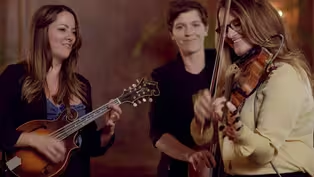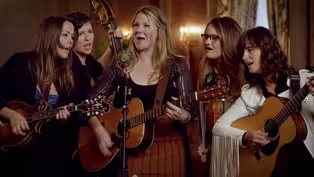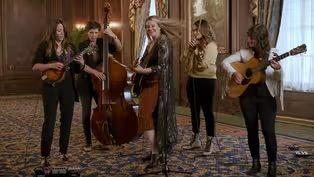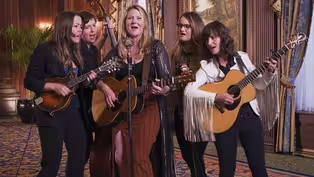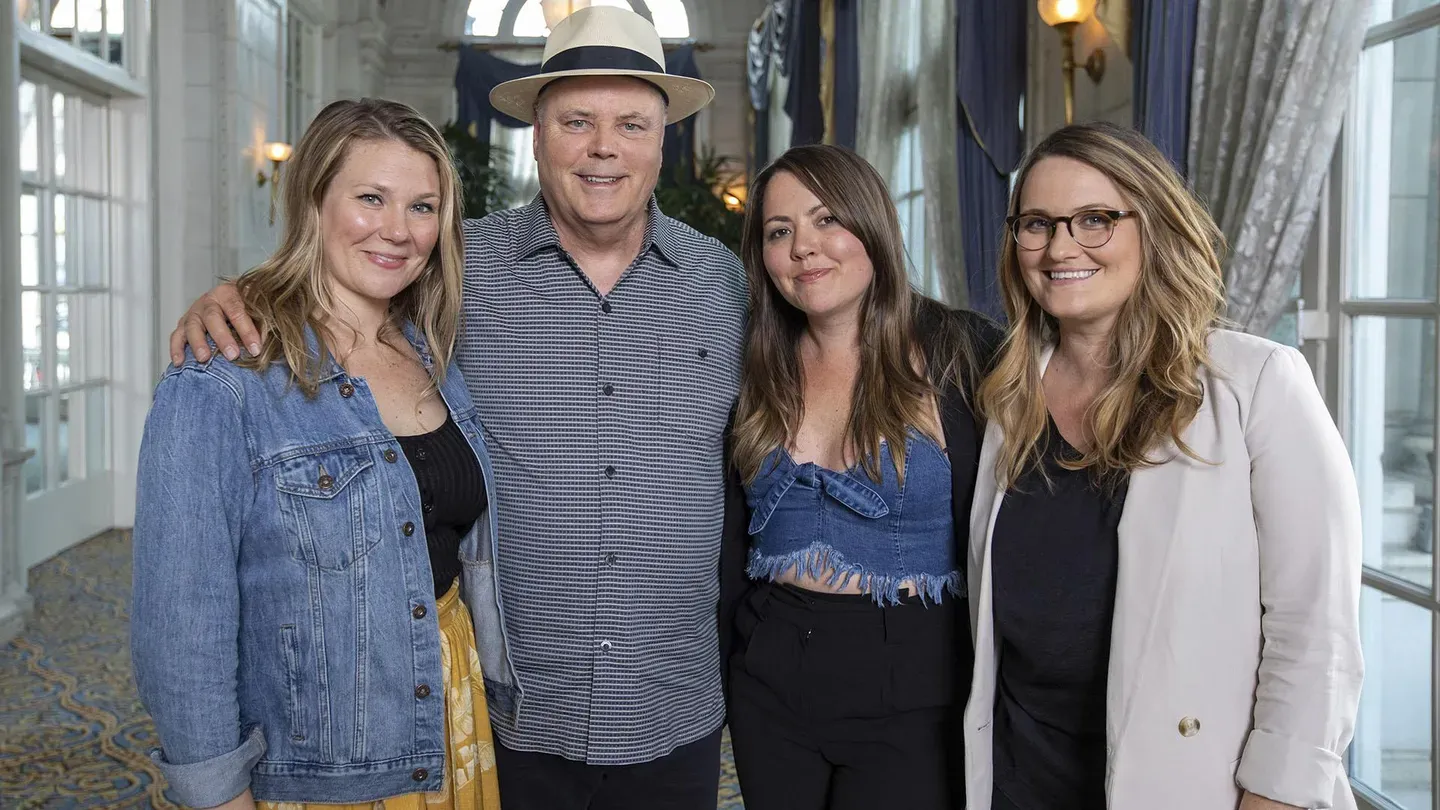

Della Mae
Season 4 Episode 1 | 24m 42sVideo has Closed Captions
David meets the powerhouse bluegrass women of Della Mae.
Della Mae is a powerhouse band of women who play bluegrass and more, and they are mentoring young female players around the world. David visits them at the historic Hermitage Hotel in Nashville, Tennessee.
Problems playing video? | Closed Captioning Feedback
Problems playing video? | Closed Captioning Feedback

Della Mae
Season 4 Episode 1 | 24m 42sVideo has Closed Captions
Della Mae is a powerhouse band of women who play bluegrass and more, and they are mentoring young female players around the world. David visits them at the historic Hermitage Hotel in Nashville, Tennessee.
Problems playing video? | Closed Captioning Feedback
How to Watch David Holt's State of Music
David Holt's State of Music is available to stream on pbs.org and the free PBS App, available on iPhone, Apple TV, Android TV, Android smartphones, Amazon Fire TV, Amazon Fire Tablet, Roku, Samsung Smart TV, and Vizio.
Buy Now
Providing Support for PBS.org
Learn Moreabout PBS online sponsorship(upbeat bluegrass music) - We're at the historic Hermitage Hotel in Nashville, Tennessee, across from the State Capitol.
A hundred years ago, Tennessee became the 36th state to ratify the 19th Amendment, playing a pivotal role in giving women the right to vote.
Della Mae is an all-female band based here in Nashville.
They're dedicated to inspiring other young women to pick up instruments and play them at the highest level.
("No See Um Stomp" by Della Mae) (upbeat bluegrass music) ♪ ♪ ♪ ♪ ♪ ♪ - What a great tune!
Did you write that one, Kimber?
- I did!
- Gosh.
Do you consider yourselves a bluegrass band?
- We are a band that has traditionally played a lot of bluegrass music.
I think the music has evolved a lot, as we have.
And we're playing, we've kind of shown all of our influences, whether it be blues, rock and roll, bluegrass, Americana, string band style music.
Yeah, we're not scared of the word bluegrass.
(laughing) - Well, it's such an inspiration to see it played so well.
Do you feel like you've inspired a lot of young women already?
- Yeah, I think we have.
The cool thing has been, so we've been a band for about nine years now, and there are women who will come up to the table when we're signing CDs after shows, and they're 18, 19-years-old, and they say, "We started a band now "because we saw you when we were 11-years-old."
- Oh, that's cool.
- And that, to us, is like, that's the most inspiring thing.
- I bet.
How did the band start?
- I started the band, yeah.
- Like nine years ago?
You decided you were gonna have an all-female band?
- I did, yeah!
I was at a music camp in California talking with Abigail Washburn, who has a great band called Uncle Earl.
And it was just late, and then we decided that it would be great to have sort of a bluegrass version of that.
And I've had to search all over to find women.
- What did you do?
Just get on the phone and start calling friends?
- I did, I did, yeah, I asked-- - So, did you know any of them beforehand?
- I did not, no.
- Wow!
- I asked a few people in the Boston music scene if they knew an amazing mandolin player who could improvise.
I wanted just total shredders at their instruments.
Jenni Lyn was living in Johnson City at the time, and she came out to Boston to see what it was all about, and basically moved from Johnson City to Boston to be in the band.
- Well, your family is from South Carolina, right?
- Hmm-mm, yep.
- You probably just grew up with bluegrass.
- I did, yeah, my grandma played banjo, dad played banjo.
We grew up going to festivals, and I got to meet Bill Monroe as a kid, bunch of my heroes.
Grew up listening to The Stanley Brothers, and Larry Sparks, Doyle Lawson, much of the early bluegrass players.
- So, it was a natural for you.
But Celia, you were into rock and roll, right?
- Yeah, I was into rock and roll.
The first music that I started listening to was Mahalia Jackson, which is not rock and roll, but-- - That's a good choice.
- Oh, the music, the voice.
So, I started listening to The Doors, and Bob Dylan, and Janis Joplin pretty early.
And my first experience with a band was I learned how to play "Me and Bobby McGee" on a guitar.
I went to college and I played it on the green, and immediately I got someone asking me to be in a band with them.
So, that's how I started my musical career.
- And then, Kimber called you?
- We met in a bar, actually.
- We did, yeah.
- Wow, that was lucky-- - At The Burren in Somerville.
- (laughs) Yeah.
- Yeah!
- And you were putting together the band at that time?
- Yeah, the first year, the band was just constantly looking for people, there was sort of a rotating cast.
I was hired to play this session at The Burren and Celia was singing and I just fell in love with her voice, got goosebumps, and yeah, just asked her out for coffee and asked her if she wanted to sing bluegrass.
(Celia laughs) - What did you think about that?
- Well, I didn't know much about bluegrass, to be honest.
The most I knew about bluegrass was Alison Krauss.
So I thought well, why would anyone wanna listen to a voice like mine?
I have a very sort of bluesy strong voice.
And it took me a while to kind of, I guess, get up the courage to feel like people in the bluegrass community might accept me, and my voice, and my style of performing and singing.
- What do you think you've brought from rock and roll to this band?
- I think performance, definitely.
I'm used to having just a microphone and getting down on my knees on the stage and jumping off the stage.
So, that was what I was used to doing and it took me a minute to like, I had to kind of calm-- - Calm down.
- some of that down 'cause you're not gonna do that in bluegrass, but you're gonna perform your feelings, you're gonna perform the song.
There's a theatrical aspect to it, so I think I brought the performance aspect from rock and roll, for sure.
- Right.
♪ Walking in the footsteps of a woman I don't know ♪ ♪ Though we've been moving slow, we've gotten somewhere ♪ ♪ Yeah, walking in the footsteps of a woman I haven't met ♪ ♪ But I've seen her on the internet crying ♪ ♪ And if it hasn't happened to you ♪ ♪ It will happen to your sister ♪ ♪ And if it hasn't happened to her ♪ ♪ It will happen to another ♪ So be a headlight in this dark night ♪ ♪ They might not be believe you, but I do ♪ ♪ You are a headlight in this dark night ♪ ♪ They might not believe you, but I do ♪ ♪ Walking in the footsteps of a woman who's endured ♪ ♪ The silence of the sisters that look nothing like her ♪ ♪ Yeah, walking in the footsteps ♪ ♪ Of a woman who speaks the truth ♪ ♪ No need to be rude, just sit back and listen ♪ ♪ And if it hasn't happened to you ♪ ♪ it will happen to your sister ♪ ♪ And if it hasn't happened to her ♪ ♪ It will happen to another ♪ So be a headlight in this dark night ♪ ♪ They might not believe you, but I do ♪ ♪ You are a headlight in this dark night ♪ ♪ They might not believe you, oh, but I do ♪ ♪ Don't let them ask you why ♪ Don't let them ask you why ♪ Oh, why you didn't speak up, oh why ♪ ♪ Don't let them ask you why ♪ Don't let them ask you why ♪ Oh, why you didn't speak up, oh why ♪ ♪ You are a headlight in this dark night ♪ ♪ They might not believe you, but I do ♪ ♪ You are a headlight in this dark night ♪ ♪ They might not believe you, oh, but I do ♪ ♪ You are a headlight in this dark night ♪ ♪ They might not believe you, but I do ♪ (gentle mandolin music) - I wrote that song in kind of a dark period of time, I would say very dark period of time for women.
The song itself is a tribute to Christine Blasey Ford and Anita Hill, both of whom testified in front of Congress for Supreme Court nominees.
It's kind of a woman's empowerment song about building one another up and about believing one another.
That's the tag line of the song is, "they might not believe you, but I do."
- Being an all-female band in basically a male-dominated bluegrass world, how has that affected you, or what is it like?
- We have experienced definitely some sexism and some issues along the way.
One thing that has really stuck out to me that now I think a lot of other female bands are doing this, is that we actually put in our contract that you can't introduce us as beautiful ladies, or based on how we look.
It has to be incredibly talented, amazing musicians, Grammy-nominated, something that describes our talents as opposed to our looks.
We had it happen enough times that we thought it was a problem.
- And people do it without thinking.
- Yeah, they do, I've even done it without thinking.
- [Kimiber] That just slips off the... - So, it's good for us to start to show people don't always introduce women based off of how they look, introduce them based off of their talents.
- We were introduced once as The Real Housewives of Bluegrass or something like that.
(all laughing) - Maybe not.
- Maybe not.
- No, no.
- Especially since you were touring 220 days a year.
- Yeah.
- What are some of the things that you've done to encourage young women to take up bluegrass, or take up instruments, really, and play them at the level that you're playing at?
- I think, just definitely leading by example.
I think just going out and playing as much as we do, and putting out records, and being available at the merchandise table to talk to young women.
- Yeah, 100%.
- The teaching that we do.
- Yeah.
- Yeah, we've done a lot of education programs with the State Department and also on our own up here in the U.S. on our own.
I'm a director of a youth academy for The California Bluegrass Association, so we all go out there and teach, and we try to do as much teaching and have conversations with young people, and especially young women.
- Yeah, I would think that the example of you having a band up on stage would be huge.
- Yeah, it is.
Yeah, I mean, just think when you see a little girl looking up at that stage and she's looking up at a bunch of men, she might think, oh, well, this is something that women don't do.
But when she's looking up at us, it's like all of the sudden she might say-- - You're doing it.
- "Mommy, I want a mandolin!"
That's what we want and I think we're starting to see it happen.
("Boston Town" by Della Mae) ♪ Standing on the floor in the city of the spindles ♪ ♪ Got me a job, lift me up to the middle ♪ ♪ The offering painted a very pretty picture ♪ ♪ Work at the mill, sell the promise of the scripture ♪ ♪ But a girl like me was worked to the bone ♪ ♪ Your fingers bled and your body moaned ♪ ♪ 14 hours a day and then ♪ My paycheck was half that of the men ♪ ♪ Looking down with oppression's face ♪ ♪ That pile of money they steal and waste ♪ ♪ Then they said they'd have to cut our pay ♪ ♪ So we broke our cage and formed the FLRA ♪ ♪ They said what a waste of a pretty girl ♪ ♪ To let the labor flag unfurl ♪ I said what more can you take from me ♪ ♪ I own my hands and my dignity ♪ ♪ So pass me a match and we'll strike it on the ground ♪ ♪ And we'll head back down to Boston town ♪ ♪ We can start a fire and they'll never put it out ♪ ♪ And we'll head back down to Boston town ♪ ♪ They said what a waste of a pretty girl ♪ ♪ To let the labor flag unfurl ♪ I said what more can you take from me ♪ ♪ I own my hands and my dignity ♪ ♪ So pass me a match and we'll strike it on the ground ♪ ♪ And we'll head back down to Boston town ♪ ♪ We can start a fire and they'll never put it out ♪ ♪ And we'll head back down to Boston ♪ ♪ Oh, pass me a match and we'll strike it on the ground ♪ ♪ We'll head back down to Boston town ♪ ♪ We can start a fire and they'll never put it out ♪ ♪ And we'll head back down to Boston, oh ♪ ♪ So pass me a match and we'll strike it on the ground ♪ ♪ And we'll head back down to Boston town ♪ ♪ We can start a fire and they'll never put it out ♪ ♪ And we'll head back down ♪ We can start a fire and they'll never put it out ♪ ♪ We'll head back down to Boston town ♪ ♪ And we'll head back down to Boston town ♪ ♪ And we'll head back down to Boston town ♪ - "Boston Town" is about these really incredible women in Lowell, Massachusetts, 1836.
They went on strike for better wages, which was really unheard of at that time.
A bunch of women going on strike asking for something was like unheard of.
I had come up with this great chorus to a song, and I realized that it was a labor union song.
And I found these women, and they inspired me so much that "Boston Town" came out of that.
"Bourbon Hound" is a song that I never really knew would see the light of day, actually.
I talk about this song a lot when I talk about writer's block, and just trying to write songs and nothing was coming out.
I was scrapping everything that I was writing, and I just looked over at my liquor cabinet, and I just decided to name as many of the bourbons as we had in that liquor cabinet.
And it turns out we had quite a few.
(Jenni laughs) So, I also added in the fact that my husband loves an old-fashioned, so that became the chorus, and here we have a song that is just fun and silly, and just kind of makes you happy.
("Bourbon Hound" by Della Mae) ♪ Why don't you swing it on back, make another Old Fashioned ♪ ♪ Stir it up right for all that dancing ♪ ♪ Baby, won't you whirl me around ♪ ♪ You know that you're my bourbon hound ♪ ♪ Well, Jefferson will set you up right ♪ ♪ Booker takes you home for the night ♪ ♪ A little Buffalo Trace and my feet are off the ground ♪ ♪ And now I'm dancing with a bourbon hound ♪ ♪ Why don't you swing it on back, ♪ ♪ make another Old Fashioned ♪ Stir it up right for all that dancing ♪ ♪ Baby, won't you whirl me around ♪ ♪ You know that you're my bourbon hound ♪ ♪ Yeah, Jameson for the morning joe ♪ ♪ I'm a whiskey girl too, now don't you know ♪ ♪ A little Bulleit for the old pass around ♪ ♪ You know there's nothing like a bourbon hound ♪ ♪ Why don't you swing it on back, ♪ ♪ Make another Old Fashioned ♪ Stir it up right for all that dancing ♪ ♪ Baby, won't you whirl me around ♪ ♪ You know that you're my bourbon hound ♪ ♪ Fox and the hound went out one night ♪ ♪ Got into a great big fight ♪ Took a draw of the Jack and fell onto the ground ♪ ♪ You know there's nothing like a bourbon hound ♪ ♪ Why don't you swing it on back, ♪ ♪ Make another Old Fashioned ♪ Stir it up right for all that dancing ♪ ♪ Baby, won't you whirl me around ♪ ♪ You know that you're my bourbon hound ♪ ♪ When you're on your feet and don't want to tire ♪ ♪ Helps to have a little nip of fire ♪ ♪ Ol' Pappy's gonna life you off the ground ♪ ♪ You know that you're my bourbon hound ♪ ♪ Why don't you swing it on back, ♪ ♪ Make another Old Fashioned ♪ Stir it up right for all that dancing ♪ ♪ Baby, won't you whirl me around ♪ ♪ You know that you're my bourbon hound ♪ - You folks have done quite a few foreign tours of 30 countries, is that correct?
- Yeah.
- Wow.
And a lot of 'em in Asia and places like Pakistan.
- Yeah, yeah.
- Places like that.
How did they react to women having an all-female band when they're not very supportive of independent women at all?
- We've seen a wide range of reactions.
For instance, the first time we played in Pakistan, we played in an all-female college in Lahore, I believe it was, and the women there, they were almost breaking down the doors with excitement to come see us, and they were screaming and yelling, and we were taking selfies with them, and they were singing along even though they've never heard the songs before.
For them, that was liberating.
However, we did play in Saudi Arabia, and we were going to play at, I think, another all-women school, and the show was shut down because there were protests about it.
But I would say overwhelmingly, they've been positive.
- Are those cultures closer to their folk music than we are, and they recognize this as folk music?
- Yes, I would say those cultures, definitely in Central Asia, actually, really everywhere we've been.
We've been to Brazil, Guyana, Russia, all of the -stans except Afghanistan.
So there is a flourishing folk music scene, yeah, yeah.
- That's what we found in traveling South America.
Everybody is very close to their folk music, - Yes, yes.
- And they recognize our folk music and appreciate it 'cause everybody hears the radio and the pop tunes.
So to hear it up close from somebody like you guys is really special.
- I would say, all over the world, folk music has so much in common.
When we were performing in Kyrgyzstan, we were able to connect to Kyrgyz's folk song to one of our tunes.
(laughs) - It was just incredible how well they worked together.
♪ You know that you're my bourbon hound ♪ ♪ Why don't you swing it on back, ♪ ♪ Make another Old Fashioned ♪ Stir it up right for all that dancing ♪ ♪ Baby, won't you whirl me around ♪ ♪ You know that you're my bourbon hound ♪ (audience cheering and applauding) (comical electronic music)
David Holt Introduces the Featured Band Della Mae
Video has Closed Captions
Clip: S4 Ep1 | 2m 56s | David Holt introduces the bluegrass band Della Mae, who play “No See Um Stomp.” (2m 56s)
Della Mae Band Plays Their Song “Boston Town”
Video has Closed Captions
Clip: S4 Ep1 | 3m 30s | The all-woman bluegrass band Della Mae plays their song “Boston Town.” (3m 30s)
Della Mae Band Plays Their Song “Bourbon Hound”
Video has Closed Captions
Clip: S4 Ep1 | 3m 17s | The all-woman bluegrass band Della Mae plays their song “Bourbon Hound.” (3m 17s)
Video has Closed Captions
Preview: S4 Ep1 | 30s | David meets the powerhouse bluegrass women of Della Mae. (30s)
Providing Support for PBS.org
Learn Moreabout PBS online sponsorshipSupport for PBS provided by:
